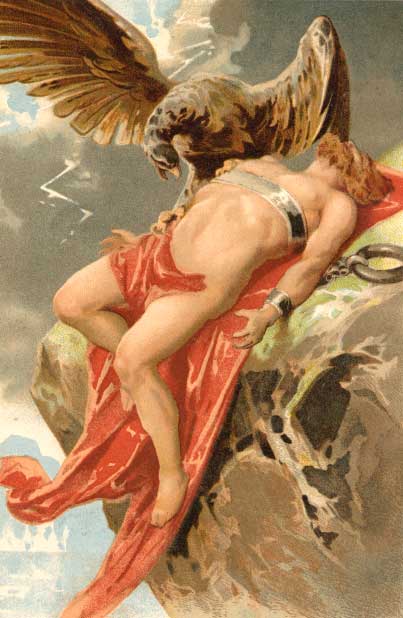Related:
Below is an excerpt from, "In Search of the Sacred: A Conversation with Seyyed Hossein Nasr on His Life and Thought" by Seyyed Hossein Nasr and Ramin Jahanbegloo, introduction by Terry Moore. 2010. Praeger Publishers: Santa Barbara, California. Pg. 146-48. [Source].
Ramin Jahanbegloo: It is interesting, because in your book Persia, Bridge of Turquoise you state that there is nothing of a Promethean nature in the Persian concept of the anthropos, especially in Islamic Persia, because of the characteristics of this culture that you were talking about.
Seyyed Hossein Nasr: Yes. This is an important point, of course, and we could also make this comment about many other traditional cultures, but since I was talking about Persia in that book, I mentioned it in the context of our own culture. What do I mean by Promethean? First of all, this is a theme which I have developed extensively specifically in my book Knowledge and the Sacred where I talk about and juxtapose the concepts Promethean Man and Pontifical Man---"Pontifical," of course, coming from the word pontifix in Latin, meaning "bridge," and therefore referring to a man who is a bridge between Heaven and earth. That is how traditional man saw himself or herself, whereas Promethean Man, going back to the myth of Prometheus, is the person who steals fire from the gods, and in the deepest sense rebels against Heaven. It is that aspect of Prometheanism that I had in mind, the kind of human rebellion against Heaven that comes to the fore in the West with the Renaissance and that characterizes so much of modern Western man's understanding of himself.
Now, in Persian culture, both in the Zoroastrian and the Islamic periods, a great deal was written about man, such as the doctrine of İnsan-ı Kâmil about which Jili, Nasafi, Mulla Sadra, and other great Sufis and philosophers wrote. But there was never this idea of rebellion of man against Heaven. As I have said before, it is interesting that in both Arabic and Persian, you do not have a word for "tragedy," and today in Persian we use the word trajedi. Why is it that we do not have this word in Persian? We have so many terms for what was translated from Greek, and our language is so rich in the rendering of Greek words. Yet, we have no Persian or Arabic word for "tragedy" in the Greek sense of the term. The reason is that the Greek idea of tragedy was related to the idea of man fighting against the gods and against destiny, as we see in the great Greek plays. It is not accidental that we do not have this word in Persian, because the idea that man can rebel against the gods, against Heaven, is something that is totally against the Persian worldview.
Look at all the Iranian religions in the pre-Islamic period, that is, Zoroastrianism, Manicheanism, and later the Zurvanite interpretation of Zoroastrianism, and also Mazdakism, about which we know so little. To the extent that we know something of these religions, we know that the Promethean idea did not exist in them. The idea of Gayomarth (Kayumarth or Primordial Man) as the prototype of humanity was always combined with obedience to God, to Ahura Mazda. There was not the idealization of rebellion of man against God, and we do not have a figure like Prometheus in our old Iranian mythology, a fact that is itself very interesting. We do have people like Zahhak. There are figures who rebel, but they are forces of evil, and people identify themselves not with such figures but with a Kave-yi Ahangar to be able to overcome such figures as Zahhak within themselves. So Zahhak represents the force of evil which we see in the mythology of every civilization, but such figures are not heroes who rebel against God in the Promethean sense, and therefore they are very different from Prometheus. In Iran, whether pre-Islamic or Islamic, you did not have a Promethean figure seen as hero; such a figure would never have been considered to be a positive one. He would be considered to be evil. Yes, in every mythology you have a way of presenting the reality of evil. You have it in Hinduism. You have it in the Chinese tradition, and we have it in the myth of Zahhak, and of course the figure of Ahriman (or the Devil) in ancient Persia. That is very different from what I am saying, that is, supporting the attempt to aggrandize man's rebelling against Heaven. Such a view was alien to our ancient, as well as our Islamic, culture.
R.J: Maybe because the Greeks . . . I mean, tragedy in ancient Greece, ancient Athens, especially in the fifth century B.C. had a very political structure. It was related to democracy and the democratic situation in Greece at that time, and that was not the case in Iran during the same period.
S.H.N: That is only partly true, because the Greek tragedies also have a very deep philosophical and religious significance. They were not only political, although of course the political element was there. Politics has of course always existed in other situations, but the fact that you have politics in itself, even one concerned with democracy, does not lead to this aggrandizement of the Promethean myth. You can go a step further and say that in ancient Greece the religion itself began to die out, and so the rebellion of man against the gods represents also the situation of the Greek religion itself that Plato himself criticized. In any case, whatever the reason, this Promethean myth did not exist in Iran.
